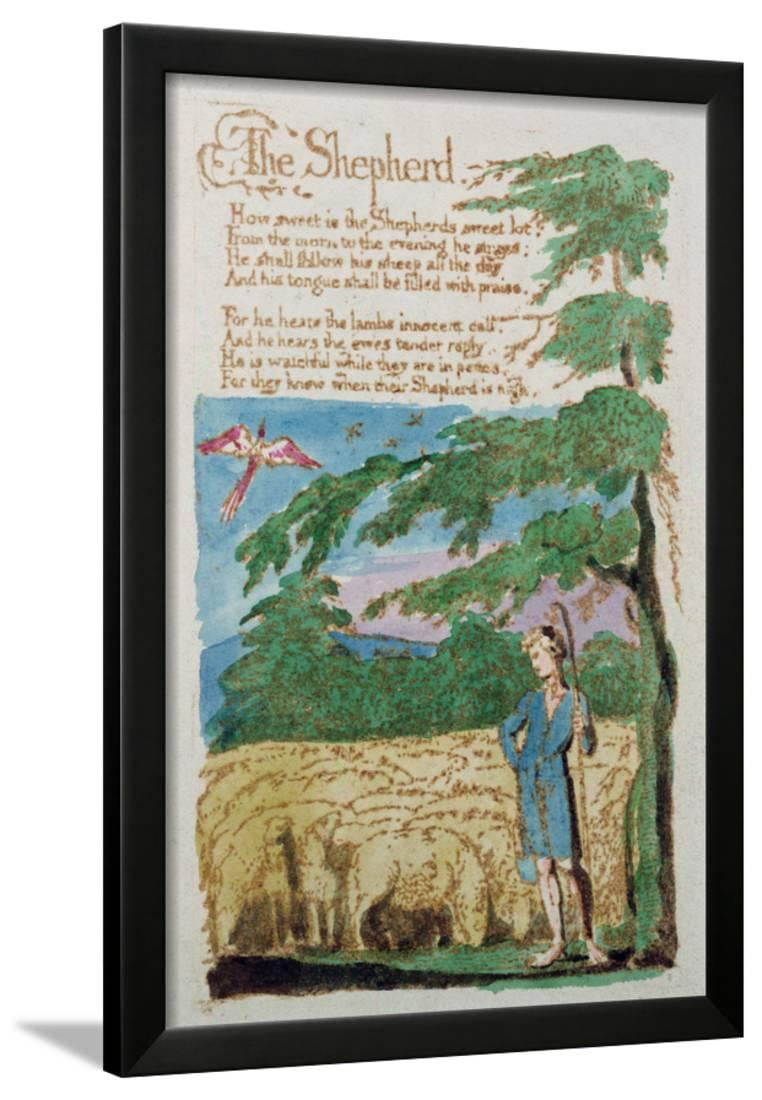

In line with the underlying anticlerical message evident in much of William Blake’s work, both “The Shepherd” and “The Angel” can be read as subtle, but stern, condemnations against church establishment.
#William blake the shepherd free#
When the angel does flee the situation and the maiden is left alone, she “dried tears, and arm’d fears,” and upon the angel’s return she states, “I was arm’d, he came in vain,” because through her maturity she has made the conscious decision in her advanced years to-if need be violently-break free from the self-deprecating condition the angel’s preoccupation with her has created. Whereas “The Shepherd” is comparable to a child yearning for the fawning of an overbearing parent, “The Angel” is that child maturing into adulthood, and desperately yearning for independence from her parents’ authority. The telling piece in the poem is that the angel is by no means a brute, but a concerned protector, yet the maiden seems to resent his presence anyway. Here, a maiden is being guarded over by a benign angel, similar to how the sheep were watched over by the shepherd, except unlike the sheep the maiden is filled with anguish rather than bliss. In contrast to “The Shepherd,” Blake’s poem in Songs of Experience titled “ The Angel,” approaches the same theme from a different standpoint. Though the poem diverts the reader’s attention from sensing anything menacing with the strategic usage of gentle words like sweet, praise, innocent, tender, and peace, the dire message here can be read as indeed one of solace for both the sheep and shepherd, but also of a particularly menacing variant, reminiscent of captive victims who have learned to identify with their captors (Stockholm Syndrome). The sheep, for their part, blissfully bask in innocent ignorance, enjoying the peace of mind grated to them through the shepherd’s protection. He asserts guard over his sheep from “morn to evening,” “following his sheep all the day,” and, “his tongue shall be filled with praise.” The Shepherd’s benefit from this relationship appears to be a self-aggrandizing one, basking in the sheep’s dependence on him. But, as is with much of Blake’s writing, there is also a sense of a sinister totalitarianism being exercised by the benign shepherd. The obvious message is the absolute sense of tranquility that is found by the herd from having a benign celestial father alertly protecting them. Quick fast explanatory summary.In his poem “ The Shepherd,” from Songs of Innocence, William Blake describes the scene of innocent sheep being diligently watched over by a sweet shepherd. Sparknotes bookrags the meaning summary overview critique of explanation online education meaning metaphors symbolism characterization itunes. The Shepherd Analysis William Blake Characters archetypes. Why did he use? short summary describing. The Shepherd Analysis William Blake critical analysis of poem, review school overview. Roleplay | Writing Forum | Viral news today | Music Theory Due to Spam Posts are moderated before posted. No requests for explanation or general short comments allowed. This may only be an analysis of the writing.

The compassion and mutual respect between the shepherd and his flock is reflected in the penlultimate line 'He is watchful whilst they are in peace, for they know when their shepherd is nigh'.

The poem is naturalistic and jovial, the use of sibilance to describe the shepherd and his relationship with his flock emphasizes the harmony of the scene 'how sweet is the shepherds sweet lot'. The Shepherd is an old and commonly used symbolic position that often appears in the bible, as Jesus is assocciated with shepherding and protecting man. William Blake's 'The Shepherd' is largely based on the relationship between God and every aspect of his creation.


 0 kommentar(er)
0 kommentar(er)
